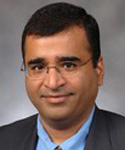Medical education that focuses on attitude-based learning may increase interest in geriatric health careers, according to a new study from researchers at Rice University, the University of Pittsburgh and the University of California–San Diego.
“With America’s senior population expected to double between 2005 and 2030, the number of geriatric health practitioners is insufficient to meet the projected health needs of the country’s burgeoning senior population,” said Vikas Mittal, study co-author and the J. Hugh Liedtke Professor of Marketing at Rice. “We must do everything possible to find ways to meet the growing demand for careers in geriatric healthcare.”
The paper, “Late-life Mental Health Education for Workforce Development: Brain vs. Heart?” revealed that affective learning, a type of learning that shapes attitudes, emotions and values, is most useful in improving medical students’ feelings towards careers in geriatric healthcare.
The study included 42 students in medical school and graduate programs of nursing, social work and clinical psychology. Participants viewed four web-based interactive video documentaries on mental health and aging at one-week intervals in random order on the Internet. The lessons, chosen from a curriculum of 13 courses developed by Fox Learning Systems out of Pittsburgh, Penn., were Successful Aging, Complicated Grief, Minority Elders and Mental Health, and Suicide in Late-life. Participants were surveyed online prior to the first lesson and again four weeks later, following the final lesson.
“Telling the real-life stories of actual people through digital media is a powerful educational tool,” said Jules Rosen, director of the University of Pittsburgh, Western Psychiatric Institute and Clinic. “Blending instructive presentations of academic experts with the video-documentaries of patients and their families enhances both cognitive and affective learning.”
The findings revealed significant improvements in both the cognitive and affective knowledge domains. Only change in affective learning was associated with an increase in “considering a geriatric career in the future.”
“A widely accepted truism of marketing is that repetition of both message and interactions are critical for changing customers’ attitudes and behaviors,” Mittal said. “As geriatric mental health educators, our goal should include further development of a well-trained workforce in addition to imparting clinical knowledge.”
The study was co-authored by University of Pittsburgh professors Jules Rosen, Emily Stiehl, Charles Reynolds and John Hennon, Fox Leaning Systems, Inc. Founder and CEO Debra Fox, and University of California – San Diego professor Dilip Jeste. It will appear in an upcoming edition of <The American Journal of Geriatric Psychiatry.
The research was funded by grants from the National Institute of Health and the Hartford Centers of Excellence in Geriatric Psychiatry in Pittsburgh and San Diego. More information on Fox Learning Systems, can be found at www.foxlearningsystems.com.



Leave a Reply